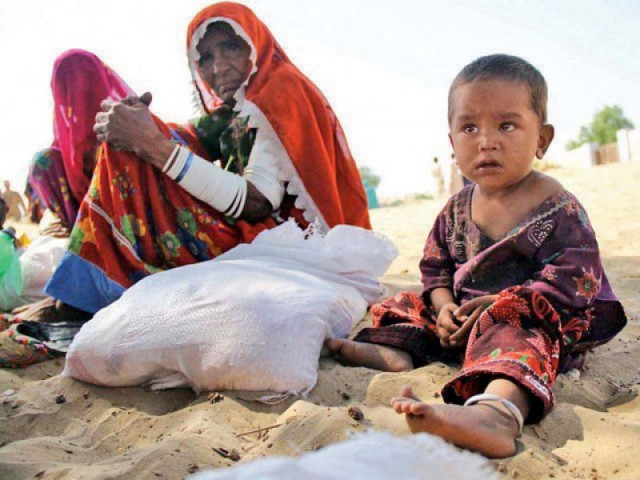Experts' huddle: Civil society casts doubt on SDGs
Consortium of NGOs in the province holds meeting to discuss goals’ implementation

The SDGs include reduction in poverty and food insecurity. PHOTO: FILE
A consultation meeting of civil society on Tuesday pondered over how they can contribute to the success of SDGs keeping in view the failure of accomplishing their predecessor. The event, titled 'Connecting SDGs with development of Sindh', was organised by Sindh SDGs Consortium, a group of non-governmental organisations volunteering for the purpose.
Some participants thought that regular monitoring of the SDGs' implementation, pointing out shortcomings and a continuous process of submitting recommendations at every stage of the project would bear fruit. However, other participants had doubts about the entire programme, describing the SDGs as yet another deceitful promise of a better future to the world's poor by the capitalist economies.
The SDGs consists of 17 targets pertaining to poverty, hunger, health, education, gender equality, clean water and sanitation, renewable energy, jobs and economic growth, innovation and infrastructure, reduced inequalities and responsible consumption. Sustainable cities and communities, climate change, life under water, life on land, peace and justice.
"A lack of coordination between the government [in Pakistan] and the civil society was one of the factors for the failure of the MDGs," contended Suleman Abro of the Sindh Agriculture and Forestry Workers Coordination Organisation.
He informed that the consortium plans to hold quarterly review meetings to evaluate the implementation of SDGs and forward proposals.
Nasir Panhwar of the Friends of Indus Forum pointed out the dearth of research-based data about the state of livelihood, shelter and facilities in Sindh. "We know that many people in Sindh don't have access to clean drinking water. But exactly how many?" he said, urging NGOs to undertake research projects.
Dr Ghulam Ali Jariko, director of the Sindh development studies centre at Sindh University, also echoed the same concern for lack of reliable data. Professor Mushtaq Meerani said the feudal system is the main stumbling block in any project aimed at the betterment of the marginalised.
Sindh Abadgar Board vice-president Zulfiqar Yousfani complained that the agriculture sector's main ailment is a continuous increase in the cost of crops and a reduction in the crop price. "The policies of the World Bank and International Monetary Fund of gradually ending subsidies on agricultural inputs are adversely affecting this sector," he claimed.
Former vice-chancellor of Sindh Agriculture University, Dr Rajab Memon, criticised the SDGs' target of raising the mark of below poverty level from $1 per day to $2 by 2030 as a deception. "It will not make much difference in the lives of poor Pakistanis if they began earning Rs200 a day after 15 years. They will remain very poor or still worse," he feared.
Zulfiqar Halepoto, a rights activist, disagreed with the notion that the SDGs are a neo-liberal agenda for corporatisation of the economies. "Our economies are already driven by international financial institutions. Our security establishment also has dangerous influences [on the economy] as we can't trade with India and within the Saarc regime," he claimed.
The participants agreed to hold more sessions and include more stakeholders in the process to achieve the SDGs.
Published in The Express Tribune, May 19th, 2016.



















COMMENTS
Comments are moderated and generally will be posted if they are on-topic and not abusive.
For more information, please see our Comments FAQ